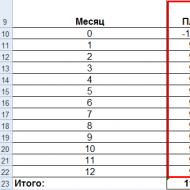
Is it worth taking loans?
We live in an economy built on loans. We are constantly persuaded to take a loan from a bank in order to make certain necessary large purchases. But many of us have acquaintances who already have most of their salaries spent only on paying off loans. So is it worth it or not to take loans? If not, why not? What can be said about this from a doctrinal point of view?
"Modern slavery is not iron chains,
but financial shackles and fetters "

To take or not to take loans is not the sphere of the Church's doctrine. If you took out a loan, then this did not stop you from being Orthodox. Equally, if you do not take loans, then this does not make you a confessor of Orthodoxy. However, this question directly relates to our spiritual life, to the sphere of Orthodox ethics.
In this regard, I will express my position, which may seem radical. First of all, credits are bait, like cheese in a mousetrap is bait. Loans are advertised as a way to improve your standard of living, to achieve what you want faster, to quickly acquire what you do not have the funds for now, but what you really want. And every time every credit deprives a person of freedom.
What exactly does credit mean? It means an elementary truth - that you do not have the money that you would like to have. You want to buy something, but there are no appropriate funds. And now you borrow them from the bank, but you have to return exorbitantly more than you took. How many people overstrained themselves, being sure that they would cope with the payment, but became hostages of the situation and lost more than they gained! But even if you manage to pay off, the loan hangs over you like a sword of Damocles. The Holy Scripture says that the debtor becomes the lender's slave (cf. Proverbs 22:7). Modern slavery is expressed in the fact that a person is chained not in iron chains, but in financial shackles and fetters.
There are people who take loans to raise their business. This is a very dangerous and risky undertaking, but, probably, the businessman sees no other way out at the moment and hopes that his profit will cover all the interest on the loan. Sometimes it works out, and sometimes it doesn't. From time to time I have to see entrepreneurs who are not free, enslaved by their loans, often do not know where else to get funds, because they do not have a single free penny, everything is invested somewhere or goes to repay loans.
Someone takes huge loans to buy housing and other real estate. It is possible that there is no other way out, but people are taking a huge risk. I know real cases when a loan was taken for twenty years, but during this period life has changed so much that there was nothing to pay off.
Any enslavement brings torment, unnecessary fears and worries. Instead of thinking about saving his immortal soul, a person throws all his strength into repaying a loan, is afraid of not paying on time and imposing penalties, works day and night, forgetting about his family and becoming unable to pray.
Loans are not only a trap, but also an expression of modern consumerism, the principle of "take whatever you want, right now." They indulge the lusts of the flesh, the lusts of the eyes and the pride of life, and in a sense contribute to the building of a new tower of Babel, in which everything earthly is quickly piled one on top of the other in order to reach the very heavens. But in reality, all this is collapsing, like that same tower.
The practice of taking loans is born out of dissatisfaction with one's position. Here the apostle Paul said: A great gain is to be godly and contented. For we have brought nothing into the world; it is clear that we cannot take anything out of it. If we have food and clothing, we will be content with that. And those who want to get rich fall into temptation and into a snare, and into many foolish and harmful lusts, which plunge people into disaster and destruction; for the love of money is the root of all evil, which, having given way, some have erred from the faith and subjected themselves to many tribulations (1 Tim. 6:6-10). This directly applies to those who take loans.
In the end, loans embody both our vanity (because we want to seem more secure), and the love of money (since everything revolves around money), and unreason (because a person does not soberly comprehend the consequences), but this unequivocally ends with despondency (for fears and anxiety deprive inner strength).
Do you need to make purchases for which you do not have money? Isn't it better to learn to live within your means, rather than chasing what you can't afford? It's self-delusion to want to acquire something that you can't earn. But most importantly, such a person will never be happy, he will always think that he is missing something. As St. John Chrysostom accurately said: "Rich is not the one who has much, but the one who does not need much."
Postpone the decision for a week, or better - for a month.

From a doctrinal point of view, we can say that any kind of attempt to interpret the modern economic system in the context of the Old Testament instructions about creditors and lending money will be a rather inadequate transfer of some historical realities to others.
I would say that if you have to take a loan in certain life circumstances, then this should be done strictly within reasonable limits so as not to be in a bad dependence on the modern banking system. So that, because of a frivolous desire to receive seemingly free money now, our children and loved ones would not suffer later.
Well, and a simple advice that has been given many times already - never take a loan on the first impulse. Especially - at the suggestion from the bank, which obtrusively came to you by phone or e-mail. If, due to specific life circumstances, you need a loan for a mortgage or education of children, and not for some kind of pampering, then postpone the decision for at least a week, or better - for a month. Take your time, pray, think, discuss with those who are smarter than you. If even then the decision does not change and remains the same, then it can be followed.
“It is better to live simply,
contented with earned honest labor "

I don't know of a more concise but precise statement about loans than a well-known joke. It sounds like this: "You take someone else's and for a while - and you give yours forever." But seriously, taking a loan is a very risky business with many unknowns. I'm not saying that usury in itself (and issuing loans on the part of banks is nothing but usury) is a sin. And we, it turns out, being drawn into the credit history, one way or another become participants in a vicious practice. But even if a person wants to start his own business (and this is quite difficult without a loan), you still need to remember that getting into debt is always a big risk, and you can, as they say, burn out big if the business doesn’t go, but there will be nothing to repay.
It all reminds me of roulette or slot machines, which, thank God, are no longer on our streets, and at one time real tragedies were played out in these gambling halls, when people, in the desire to get rich quickly, lost everything and not only suffered themselves, but plunged into poverty, despair and horror of their families and loved ones ... God forbid! This is also possible with loans.
We all know those heartbreaking stories of how people take seemingly little money, but end up in a desperate situation as a result of bank manipulations with interest. My personal opinion is that it is better to live simply, being content with small, earned honest work, than embarking on dubious adventures (and a credit history is almost always a gamble, a game, a bet "for luck"). In addition, the reason that people get into debt is often the notorious psychology of consumption, when it seems to a person that he must certainly have “everything like everyone else”. A person begins to chase after some mythical standard of comfort and security, often forgetting the main thing: the fullness of life, true happiness lies in agreement with God, one's own conscience, in good relations with others. In the gospel language it sounds like this: Beware of covetousness, for a person's life does not depend on the abundance of his possessions (Luke 12:15).
















